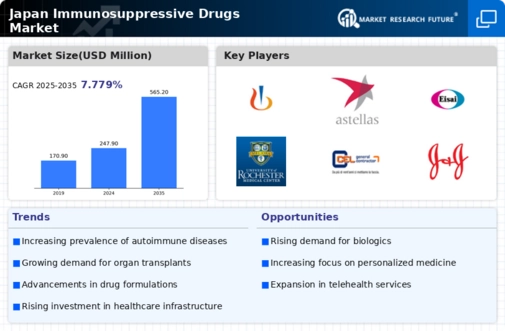Rising Healthcare Expenditure
The increase in healthcare expenditure in Japan is a significant driver for the immunosuppressive drugs market. As the government allocates more resources to healthcare, there is a corresponding rise in funding for innovative treatments, including immunosuppressive therapies. In recent years, healthcare spending has grown at an annual rate of approximately 2.5%, reflecting the commitment to improving patient care. This financial support enables healthcare providers to offer a wider range of treatment options, including advanced immunosuppressive drugs that may have previously been cost-prohibitive. As a result, patients gain access to essential therapies that can improve their quality of life, thereby stimulating demand within the immunosuppressive drugs market. The trend of increasing healthcare expenditure is likely to continue, further enhancing market opportunities.
Regulatory Support for Drug Approvals
Regulatory support from the Japanese government plays a pivotal role in shaping the immunosuppressive drugs market. The Pharmaceuticals and Medical Devices Agency (PMDA) has streamlined the drug approval process, facilitating quicker access to new therapies for patients. This supportive regulatory environment encourages pharmaceutical companies to invest in the development of immunosuppressive drugs, knowing that their innovations can reach the market more rapidly. Additionally, the government has implemented various initiatives to promote research and development in the healthcare sector, further bolstering the market. As a result, the immunosuppressive drugs market is likely to experience accelerated growth, with an increasing number of new products entering the market to meet the rising demand.
Advancements in Pharmaceutical Research
Ongoing advancements in pharmaceutical research are significantly influencing the immunosuppressive drugs market. Japanese pharmaceutical companies are investing heavily in research and development to create novel immunosuppressive agents that offer improved efficacy and safety profiles. The market has witnessed the introduction of biologics and targeted therapies, which have shown promising results in clinical trials. For instance, the approval of new biologic agents has led to a surge in treatment options for patients with severe autoimmune conditions. This innovation not only enhances patient outcomes but also drives market growth, as healthcare providers increasingly adopt these advanced therapies. The competitive landscape is evolving, with companies striving to differentiate their products through unique mechanisms of action and improved patient adherence.
Growing Prevalence of Autoimmune Diseases
The rising incidence of autoimmune diseases in Japan is a crucial driver for the immunosuppressive drugs market. Conditions such as rheumatoid arthritis, lupus, and multiple sclerosis are becoming increasingly common, affecting a significant portion of the population. According to recent health statistics, autoimmune diseases account for approximately 5% of the total population in Japan. This growing prevalence necessitates the development and availability of effective immunosuppressive therapies, thereby propelling market growth. As healthcare providers seek to manage these chronic conditions, the demand for innovative and effective immunosuppressive drugs is likely to increase, indicating a robust market potential. Furthermore, the aging population in Japan, which is more susceptible to these diseases, further amplifies the need for targeted immunosuppressive treatments.
Increasing Awareness of Treatment Options
There is a growing awareness among healthcare professionals and patients regarding the treatment options available for autoimmune diseases, which is positively impacting the immunosuppressive drugs market. Educational initiatives and campaigns aimed at both healthcare providers and patients have led to a better understanding of the benefits and risks associated with immunosuppressive therapies. This heightened awareness encourages patients to seek treatment earlier, thereby increasing the demand for these drugs. Furthermore, as more patients become informed about their conditions and the available therapies, the likelihood of adherence to prescribed treatment regimens improves. Consequently, this trend is expected to drive the growth of the immunosuppressive drugs market, as more individuals opt for effective management of their autoimmune diseases.
















